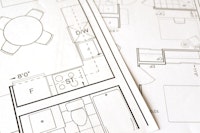Table of contents
There are many things you can do with the surplus value of your property. For example, you can put the surplus value into your new house, make a loan or gift to your children, or finance a renovation with it. Do you want to know what surplus value is and what you can use the surplus value of your house for? We list the options for you.
What is surplus value?
There is a surplus value on your house when the market value is higher than the remaining mortgage. If your house is now worth € 350,000, while your mortgage debt is still open for € 200,000, you then have a surplus value of € 150,000.
Pay attention: the surplus value depends on the market value. If house prices fall, the market value of your property will also fall. If the market value is lower than the mortgage debt, we are talking about a 'negative equity'.
Engage a valuer to determine the current market value of your property. This way you quickly find out what the current market value is and whether there is a surplus value.
How can surplus value be created?
Surplus value on a property can be created in different ways, such as:
- Rising house prices. In the current housing market with rising house prices, many Dutch people have created a surplus value on their house.
- A renovation. If you have invested in the property through a renovation, this usually has a positive effect on the value of your house. After all, the house has a larger surface area, is better finished or has a brand new kitchen or bathroom, which increases the selling price.
- Repayment of (part of) the mortgage. The more you repay, the smaller the mortgage debt becomes. This can also create surplus value.
What can you use the surplus value of your house for?
Are you one of the lucky ones with a surplus value on your property, and are you curious in which ways you can benefit from this? We list the different options for you.
1. Use surplus value of house for a new property
One way to smartly use the surplus value of your house is by putting it into a new house. By using the surplus value for the purchase of a new house, you need a lower mortgage. In addition, the interest rate is lower. In this way, you have more money left over to live off and to do fun things. Especially when you choose to live smaller.
You don't have to put your surplus value into your new house. You can also choose to buy the house entirely with a loan. You can then use the money for a renovation, for example.
The surplus fund scheme
It is entirely up to you whether you want to put the surplus value in your new house. Just be aware of the surplus fund scheme. That scheme determines that you can only (under conditions) deduct the interest on your (new) mortgage from the income tax when you have put the surplus value in your new property. So if you do not use the surplus value (or part of it) for the financing of your new house, part of the interest on your new loan is no longer deductible for income tax. The government does this to encourage you to keep your mortgage debt as low as possible.
The bridging mortgage
Do you have a new property in mind, but your 'old' property has not yet been sold? With a bridging mortgage it is possible to use (part of) the surplus value already for the purchase of your new property. When you sell the 'old' property, the bridging mortgage is paid off.
Need a real estate agent for selling your property?
Are you planning to sell your house and have you not yet engaged a real estate agent? Through Mijn Verkoopmakelaar you will quickly find the best real estate agents in your area. Sign up via the button below and receive free and non-binding proposals from agents in your area. Want to know more? Read everything about how Mijn Verkoopmakelaar works.
- Independent
- No obligation
- Free
- Fast
2. Using home equity for a renovation
If there is equity on your property, this makes it easier to get an additional loan for a renovation. You can increase your current mortgage for this or take out a second mortgage. Conditions are that your house adds extra value to your property through the renovation and that you can pay the loan. You can use the money, for example, for sprucing up your garden, installing a new kitchen, renovating your bathroom, or building an extension.

3. Using home equity for the purchase of a second house
Just as you can use the home equity for a renovation, you can also use it for the (partial) financing of a second house. Your current mortgage is then increased by the amount of the equity. Of course, under the condition that you can bear the new burdens with your income. The mortgage provider will test this before the mortgage increase is granted.
Additional conditions for financing the purchase of a second home
If you are thinking of buying a second home, be aware that there are additional conditions attached to obtaining a mortgage. When the second home does not serve as the main residence, you can (usually) not get a full mortgage from the mortgage provider. So, you will have to finance a portion of the amount yourself.
In obtaining the partial mortgage, mortgage providers can set various conditions, such as:
- Building requirements
- Interest surcharge
- Restrictions on the use of the property, such as a rental ban
4. Lower mortgage interest with equity
If you have equity on your property, it may sometimes be possible that your rate goes to a lower rate group. The reason for this is that the mortgage provider runs less risk with equity. Ask your mortgage provider for the conditions.
5. Using equity for the purchase of a house for your (grand)child
In the current housing market, homeowners benefit from rising house prices. For starters, it is quite a challenge to buy a first house. As a parent, you can use the equity of your own home in various ways to help your child with the purchase of a home. The same applies to grandparents and grandchildren. So, you can borrow or donate an amount to your (grand)child.

Taking out equity for a loan or donation to your child
If your (grand)child is between 18 and 40 years old, you as a (grand)parent may donate him or her up to € 106.671 (in 2022) tax-free for the purchase of a property. The property should be used as a main residence. The donation can also be used for a renovation or the repayment of a mortgage (box 1).
If you want to use this, you will have to increase your own mortgage. Then you donate or lend the amount to your (grand)child. The loan or donation can be recorded by a notary if you wish. For more information about taking out the equity and using it, contact an advisor.
The effect of the donation or loan on taxes
As the equity is not used for your own home, the interest on that amount is not deductible from tax. If you lend money to your (grand)child, you can deduct this amount from your assets that are taxed in box 3.
6. Using equity as an addition to your pension
You can also use your equity to generate some extra pension for yourself. Deposit the amount of equity in your savings account and supplement your pension with it so that you can continue to live comfortably.
To 'cash in' the equity, you normally have to sell your house first, after which the money becomes available. Fortunately, an alternative is offered for (almost) pensioners. From (approximately) your state pension age, you have the opportunity to take out, among other things, a 'silver mortgage' or 'eat mortgage'. This releases the equity, which you receive in full or in instalments. You can then do whatever you want with the equity, for example, supplement your pension, invest, or make a donation.
7. Other things you can do with equity
In addition to the above - common - uses of equity, you can of course use equity in many more ways. For example, you can live cheaper and use the home equity to make a nice trip, make an investment, finally buy that dream car, pay off your debts or buy that camper and make a world trip. It's up to you!
Tip: always engage an advisor if you intend to take up or use your equity. This way you will not be faced with (among other things, tax technical) surprises.
Discover more about selling a property:


















